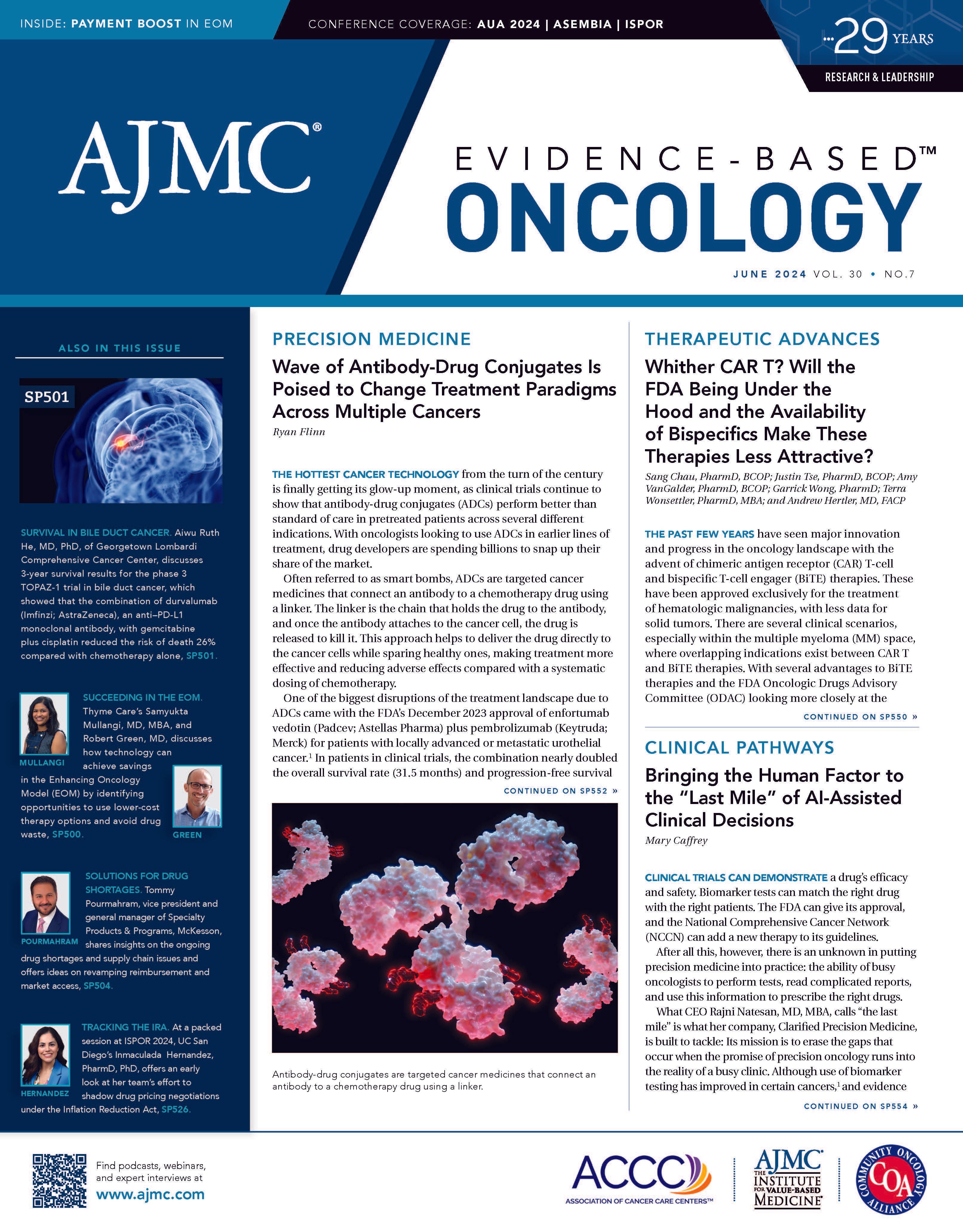- Center on Health Equity & Access
- Clinical
- Health Care Cost
- Health Care Delivery
- Insurance
- Policy
- Technology
- Value-Based Care
Wave of Antibody-Drug Conjugates Poised to Change Treatment Paradigms Across Multiple Cancers
The hottest cancer technology from the turn of the century is finally getting its glow-up moment, as clinical trials continue to show that antibody-drug conjugates (ADCs) perform better than standard of care in pretreated patients across several different indications. With oncologists looking to use ADCs in earlier lines of treatment, drug developers are spending billions to snap up their share of the market.
Often referred to as smart bombs, ADCs are targeted cancer medicines that connect an antibody to a chemotherapy drug using a linker. The linker is the chain that holds the drug to the antibody, and once the antibody attaches to the cancer cell, the drug is released to kill it. This approach helps to deliver the drug directly to the cancer cells while sparing healthy ones, making treatment more effective and reducing adverse effects compared with a systematic dosing of chemotherapy.
One of the biggest disruptions of the treatment landscape due to ADCs came with the FDA’s December 2023 approval of enfortumab vedotin (Padcev; Astellas Pharma) plus pembrolizumab (Keytruda; Merck) for patients with locally advanced or metastatic urothelial cancer.1 In patients in clinical trials, the combination nearly doubled the overall survival rate (31.5 months) and progression-free survival (PFS; 12.5 months) compared with patients who received platinum-based chemotherapy.2
Vadim S. Koshkin, MD | Image credit: UCSF

“That’s overturned several decades of the standard of care, just over the last several months,” said Vadim S. Koshkin, MD, a genitourinary oncologist who specializes in caring for adults with bladder, prostate, kidney, and testicular cancers at University of California, San Francisco (UCSF) Health.
For decades, the most effective therapy for bladder cancer has been the chemotherapy cisplatin, first approved for use in the US in 1978.3 However, the treatment’s highly toxic nature—the reason it’s effective in killing cancer cells—also damages healthy cells. For that reason, patients who have significant hearing loss, neuropathy, heart failure, or other signs of poor performance at the onset aren’t good candidates for cisplatin, said Terence Friedlander, MD, professor of medicine and Robert and Virginia O’Reilly Family Endowed Chair Chief, Zuckerberg San Francisco General Hospital Division of Hematology/Oncology, Helen Diller Family Comprehensive Cancer Center, University of California, San Francisco.
Terrence Friedlander, MD | Image credit: UCSF

“For a lot of patients, [cisplatin] was unfortunately the best and most effective drug, though about half of patients are not even eligible to get platinum therapy,” Friedlander said.
First debuting at the turn of the 21st century, early versions of ADCs had a variety of issues that made them less effective than later generations, including antibodies that weren’t selective enough for their targets and weak linkers that would prematurely release their payloads, leading to systematic toxicity.4 However, improvements in antibody engineering, more stable linkers, and more toxic payloads have greatly improved their efficacy.
While the first ADC to be approved by the FDA was Pfizer’s gemtuzumab ozogamicin (Mylotarg) in 2001, the drug class began its renaissance in 2011 when the FDA gave the nod to Seagen’s brentuximab vedotin (Adcetris) for Hodgkin lymphoma and anaplastic large cell lymphoma. At the time, it was the first new drug to be approved for Hodgkin lymphoma in more than 30 years.5 That was followed by another pivotal ADC approval by the FDA in 2013 of trastuzumab emtansine (Kadcyla), Genentech/Roche’s therapy for HER2-positive (HER2+) metastatic breast cancer. In total, the FDA has greenlit 12 ADCs, with more than half of those receiving approval only in the past few years, since 2020.6
Today, more than 160 ADCs are in development, with 85% targeting solid tumors, mostly breast and lung indications, according to an analysis published in April 2024 by Nature Reviews.7 A closer look at these therapies revealed that those in late-stage trials are aiming to improve on existing ADCs, while 75% of earlier-stage therapies are experimenting with new combinations of targets and payloads.
ADCs have greatly changed the treatment landscape in breast cancer as well, with multiple approvals for solid tumors in recent years. In February, the FDA approved sacituzumab govitecan (Trodelvy; Gilead) for patients with unresectable locally advanced or metastatic hormone receptor–positive (HR+), HER2-negative (HER2–) breast cancer following endocrine-based therapy and at least 2 additional systemic therapies in the metastatic setting.8
Paolo Tarantino, MD | Image credit: Dana-Farber Cancer Institute

“Five years ago, you wouldn’t have had much to give to these patients,” said Paolo Tarantino, MD, of the Dana-Farber Cancer Institute. “Now you have a drug that you’re almost sure that the patient is going to have at least stability [on], but most times a shrinkage in response of disease—and that in the clinic is huge.”
Tarantino also referenced the results of the DESTINY-Breast06 trial (NCT04494425), which tested trastuzumab deruxtecan (T-DXd) (Enhertu; AstraZeneca and Daiichi Sankyo) in HER2-low and HER2-zero breast cancer. This trial demonstrated that T-DXd could significantly improve PFS compared with standard chemotherapy, even in patients with minimal HER2 expression.9
“It’s fascinating to see a drug originally designed for HER2+ patients show such efficacy in HER2-low and HER2-zero cases,” Tarantino said.
The potential of not needing a highly expressed target opens up new possibilities for future clinical trials, said Ian Krop, MD, PhD
Ian Krop, MD, PhD | Image credit: Yale Cancer Center

, a medical oncologist and chief clinical research officer at the Yale Cancer Center.
“Originally people assumed if you’re going to find another target, you need to find one that is highly overexpressed,” Krop said. “But now what we’re seeing with these next-generation drugs, with new technology, is that you don’t.”
Now, clinicians are also wondering how far they can push the positive results with combinations of ADCs and other therapies, said Bradley McGregor, MD, medical oncologist at the Dana-Farber Cancer Institute and director of clinical research for the Lank Center of Genitourinary Oncology. His own Double Antibody Drug Conjugate (DAD) study (NCT04724018)10 combined enfortumab vedotin and sacituzumab govitecan, with each targeting different proteins on the surface of bladder cancer cells and carrying distinct cytotoxic payloads. This allows for a synergistic effect, minimizing overlapping toxicities, he said.
Bradley McGregor, MD | Image credit: Dana-Farber Cancer Institute

“We showed that you can combine 2 ADCs just like you combine other chemotherapy if you choose the right combination,” McGregor said. The objective response rate was 70% with 3 complete responses (out of 23 total participants). “I mean, that’s just unheard of.”
As a next step, McGregor is exploring the efficacy of adding pembrolizumab to the mix. This study, DAD-IO (DAD With Immunotherapy), will seek to determine whether the addition of an immune checkpoint inhibitor can further boost the antitumor response. He’s hopeful for the potential of these combinations to help patients not only with metastatic disease but also in earlier stages, with the goal of achieving bladder preservation and possibly even eliminating the need for surgery in some cases.
“If we reach a point where we’re able to cure patients with a combination of ADCs, even therapy and surgery, then we can start asking ourselves, do we even need the surgery?” McGregor said.
ADC Deals Multiply
The deluge of promising clinical trial results in recent years has spurred drug developers to open their wallets to the tune of nearly $50 billion to snag access to ADCs both approved and in development.
The largest deal in the space was Pfizer’s $43 billion acquisition of Seagen,11 announced in March 2023. Merck also jumped in on the action, paying Daiichi Sankyo $4 billion12 last year as an up-front advance on a potential $22 billion deal to jointly develop and commercialize 3 of Daiichi Sankyo’s ADCs: patritumab deruxtecan (HER3-DXd), ifinatamab deruxtecan (I-DXd), and raludotatug deruxtecan (R-DXd).
Bristol Myers Squibb may have been the most active with 3 deals, including an $800 million payment13 to SystImmune to codevelop an EGFR x HER3 bispecific ADC for non–small cell lung cancer; $100 million to acquire14 Orum Therapeutics’ anti-CD33 antibody-enabled GSPT1 degrader, cleared by the FDA for a phase 1 trial for patients with acute myeloid leukemia or high-risk myelodysplastic syndromes; and a $22.75 million payment15 to Tubulis to access its ADC program for a range of solid tumors.
AstraZeneca’s investment in ADCs includes the May 20, 2024, announcement that the company will build a $1.5 billion manufacturing plant in Singapore specifically for ADCs.16 Besides trastuzumab deruxtecan, now approved in multiple indications, AstraZeneca and Daiichi Sankyo are now developing datopotamab deruxtecan. In October 2023, results presented at the European Society for Medical Oncology Congress showed datopotamab deruxtecan reduced the risk of disease progression or death by 37% in patients with previously treated HR+, HER2-low or HER2–breast cancer, providing a 2-month median PFS benefit, and was well tolerated in a post–endocrine therapy setting.17 In April 2024, the FDA accepted the biologics license application for datopotamab deruxtecan for patients with previously treated metastatic HR+, HER2– breast cancer.18
Dana-Farber’s Tarantino said research has already begun on a new generation of ADCs that swap out the chemotherapy payload for other treatments, such as immunostimulants, radioisotopes, and protein degraders. These innovative payloads could provide additional mechanisms to attack cancer cells and overcome resistance to traditional treatments.
Patients Need Education
Although the results seen with ADCs have been impressive, the treatment can cause adverse effects that need to be managed, said Jamie Carroll, APRN, CNP, MSN, a nurse practitioner at Mayo Clinic in Rochester, Minnesota.
Jamie Carroll, APRN, CNP, MSN | Image credit: Mayo Clinic

“ADCs do cause fatigue,” Carroll said, with up to 40% of patients with breast cancer on the therapy reporting feeling tired.19 “It’s important as you’re seeing your patient in the clinic that you’re talking to them and really understanding the patient and understanding what medications they are taking.”
Many patients may be taking supplements, antianxiety medication, or other drugs that could impact their sleep. While grade 1 fatigue may be expected, grade 2, where the patient feels tired even after taking a nap, may require more medication management.
“At that point you need to consider whether a dose reduction is necessary for your patient,” Carroll said. “Because remember, all of these patients who are getting ADCs for the most part are going to be metastatic patients.”
For all their successes, not all ADCs have been universally better than existing treatments. In December, Sanofi announced it was shelving development of tusamitamab ravtansine after the drug failed to meet a primary end point in a phase 3 trial in patients with metastatic nonsquamous non–small cell lung cancer.20 A month later, Gilead also announced its ADC, sacituzumab govitecan, didn’t meet its primary end point of overall survival in previously treated patients with metastatic non–small cell lung cancer.21
Still, despite these setbacks, many in the field are feeling positive about ADCs’ ability to continue to change the treatment landscape.
“This is something that will continue to grow,” Koshkin said. “There are various approaches of combining different [ADCs] with immunotherapy, and that opens up a wide range of possibilities of how we can treat patients and hopefully improve their outcomes.”
References
1. FDA approves enfortumab vedotin-ejfv with pembrolizumab for locally advanced or metastatic urothelial cancer. FDA. December 15, 2023. Accessed May 21, 2024. https://bit.ly/3UVk6wK
2. Joszt L. First in decades: enfortumab vedotin + pembrolizumab beats chemo in first-line metastatic urothelial cancer. AJMC. October 22, 2023. Accessed December 18, 2023. https://www.ajmc.com/view/first-in-decades-enfortumab-vedotin-pembrolizumab-beats-chemo-in-first-line-metastatic-urothelial-cancer
3. Dasari S, Tchounwou PB. Cisplatin in cancer therapy: molecular mechanisms of action. Eur J Pharmacol. 2014;740:364-378. doi:10.1016/j.ejphar.2014.07.025
4. Kamath AV, Iyer S. Challenges and advances in the assessment of the disposition of antibody‐drug conjugates. Biopharm Drug Dispos. 2016;37(2):66-74. doi:10.1002/bdd.1957
5. FDA approves Adcetris to treat two types of lymphoma. News release. FDA. August 19, 2011. Accessed May 21, 2024. https://www.prnewswire.com/news-releases/fda-approves-adcetris-to-treat-two-types-of-lymphoma-128086178.html
6. Furlow M, Corridon C, Coyle B, Bonnot R. Oncology’s next revolution: antibody-drug conjugates and how to push them into the future. ZS Insights. March 12, 2024. Accessed May 21, 2024. https://www.zs.com/insights/oncology-antibody-drug-conjugates-revolution
7. Flynn P, Suryaprakash S, Grossman D, Panier V, Wu J. The antibody–drug conjugate landscape. Nature Rev Drug Discov. April 16, 2024. Accessed May 22, 2024. https://www.nature.com/articles/d41573-024-00064-w
8. US FDA approves Trodelvy in pre-treated HR+/HER2- metastatic breast cancer. News release. Gilead Sciences. February 3, 2023. Accessed May 17, 2024. https://www.gilead.com/news-and-press/press-room/press-releases/2023/2/us-fda-approves-trodelvy-in-pretreated-hrher2-metastatic-breast-cancer
9. Enhertu (fam-trastuzumab deruxtecan-nxki) demonstrated statistically significant and clinically meaningful improvement in progression-free survival in HR-positive, HER2-low metastatic breast cancer following one or more lines of endocrine therapy in DESTINY-Breast06 phase III trial. News release. AstraZeneca. April 29, 2024. Accessed April 30, 2024. https://bit.ly/3QWLdX0
10. McGregor BA, Sonpavde GP, Kwak L, et al. The double antibody drug conjugate (DAD) phase I trial: sacituzumab govitecan plus enfortumab vedotin for metastatic urothelial carcinoma. Ann Oncol. 2024;35(1):91-97. doi:10.1016/j.annonc.2023.09.3114
11. Pfizer invests $43 billion to battle cancer. News release. Pfizer. March 13, 2023. Accessed May 21, 2024. https://www.pfizer.com/news/press-release/press-release-detail/pfizer-invests-43-billion-battle-cancer
12. Daiichi Sankyo and Merck announce global development and commercialization collaboration for 3 Daiichi Sankyo DXd ADCs. News release. Merck. October 19, 2023. Accessed May 21, 2024. https://www.merck.com/news/daiichi-sankyo-and-merck-announce-global-development-and-commercialization-collaboration-for-three-daiichi-sankyo-dxd-adcs/
13. SystImmune and Bristol Myers Squibb announce global strategic collaboration agreement for the development and commercialization of BL-B01D1. News release. Bristol Myers Squibb. December 11, 2023. Accessed May 21, 2024. https://news.bms.com/news/details/2023/SystImmune-and-Bristol-Myers-Squibb-Announce-a-Global-Strategic-Collaboration-Agreement-for-the-Development-and-Commercialization-of-BL-B01D1/default.aspx
14. Orum Therapeutics announces acquisition of ORM-6151 program by Bristol Myers Squibb. News release. Orum Therapeutics. November 6, 2024. Accessed May 21, 2024. https://www.orumrx.com/news/orum-orm-6151-acquisition-by-bms
15. Tubulis announces strategic license agreement with Bristol Myers Squibb to develop next generation ADCs for the treatment of certain cancer patients. News release. Tubulis. April 20, 2023. Accessed May 21, 2024, https://tubulis.com/news/tubulis-announces-strategic-license-agreement-with-bristol-myers-squibb-to-develop-next-generation-adcs-for-the-treatment-of-cancer-patients-2/
16. AstraZeneca plans $15 billion manufacturing facility for antibody drug conjugates (ADCs) in Singapore. News release. AstraZeneca. May 20, 2024. Accessed May 21, 2024. https://www.astrazeneca.com/media-centre/press-releases/2024/astrazeneca-to-manufacture-adcs-in-singapore.html
17. Datopotamab deruxtecan significantly extended progression-free survival vs. chemotherapy in patients with HR-positive, HER2-low or negative breast cancer in TROPION-Breast01 phase III trial. News release. AstraZeneca. October 23, 2023. Accessed May 21, 2024. https://www.astrazeneca.com/media-centre/press-releases/2023/datopotamab-deruxtecan-significantly-extended-progression-free-survival-vs-chemotherapy-in-tropion-breast01-phase-iii-trial.html
18. Datopotamab deruxtecan Biologics License Application accepted in the US for patients with previously treated metastatic HR-positive, HER2-negative breast cancer. News release. AstraZeneca. April 2, 2024. Accessed May 21, 2024. https://www.astrazeneca.com/media-centre/press-releases/2024/fda-accepts-dato-dxd-bla-for-breast-cancer.html
19. Zhang H, Shen G, Yang P, et al. Incidence of antibody-drug conjugate-related fatigue in patients with breast cancer: a systematic review and meta-analysis. Crit Rev Oncol Hematol. 2024;196:104292. doi:10.1016/j.critrevonc.2024.104292
20. Sanofi announces end of program evaluating tusamitamab ravtansine after a 2L NSCLC phase 3 trial did not meet a primary endpoint. News release. Sanofi. December 21, 2023. Accessed May 21, 2024. https://www.sanofi.com/en/media-room/press-releases/2023/2023-12-21-06-30-00-2799759
21. Gilead provides update on phase 3 EVOKE-01 study. News release. Gilead. January 22, 2024. Accessed May 21, 2024. https://www.gilead.com/news-and-press/press-room/press-releases/2024/1/gilead-provides-update-on-phase-3-evoke-01-study

Exploring Racial, Ethnic Disparities in Cancer Care Prior Authorization Decisions
October 24th 2024On this episode of Managed Care Cast, we're talking with the author of a study published in the October 2024 issue of The American Journal of Managed Care® that explored prior authorization decisions in cancer care by race and ethnicity for commercially insured patients.
Listen
